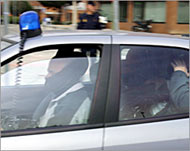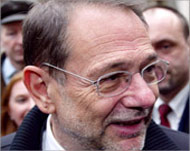Madrid suspects to stay behind bars
Three Moroccans and two Indians suspected of involvement in the Madrid train bombings have been remanded in custody without possibility of bail, after being questioned by a top Spanish judge.

Court sources told reporters on Friday the group were accused of “belonging to a terrorist organisation, committing 190 murders and 1400 attempted murders, causing four cases of material damage and stealing a vehicle”.
“Supreme Court judge Juan del Olmo has ordered that the five people arrested last Saturday should be imprisoned unconditionally and incommunicado,” the court sources said on condition of anonymity.
The two Indians are suspected of “collaborating with a terrorist organisation and falsifying documents,” they added.
“The five detainees have denied all involvement in the acts for which they are accused.”
The five, who are being held under Spain’s anti-terrorism legislation, have not been formally charged over the bombings on 11 March.
The last official toll for the attacks stood at 202 people dead and more than 1500 injured.
The sources said the suspects were being taken to Soto de Real jail, 37km north of Madrid.
EU meeting on security
Meanwhile, European Union interior ministers met under tight security for emergency talks on how to respond to last week’s Madrid bomb blasts, which have rocketed terrorism to the top of the EU’s agenda.
|
“Supreme Court judge Juan del Olmo has ordered that the five people arrested last Saturday should be imprisoned unconditionally and incommunicado” Court sources |
Amid a heightened state of alert across Europe, the EU is expected to create a new “Mr Terrorism” post to coordinate security strategy and agree on a solidarity clause pledging all to come to the aid of an attacked EU state.
But simmering discord persists in particular over the sensitive issue of intelligence-sharing, with proposals for a “European CIA” facing likely rejection from EU heavyweights including France and Britain at the talks, hastily arranged after the devastating Spanish attacks.
The Madrid blasts have revived fears of al-Qaida attacks two and a half years after the September 2001 attacks on the United States.
British Home Secretary David Blunkett – whose country is considered under particular threat – said the priority should be implementing what was agreed after 9/11, rather than hammering out new measures.
“For goodness sake let’s implement what we’ve agreed to. Let’s cut out the waffle and let’s make sure that whatever we do, we’re practising what we preach at home,” he said.
 |
|
Three Moroccans and two Indians |
Even before the talks started, the ministers from five key EU countries – Britain, France, Germany, Spain and Italy – announced they were sending their intelligence chiefs to Madrid next Monday to study how to boost cooperation.
European CIA questioned
Germany’s Otto Schily slapped down the idea of a European CIA. “That would not be useful. We have to network the intelligence services that exist,” he said, calling for regular meetings of intelligence chiefs in Brussels.
Security was visibly tightened for the Brussels talks. Journalists and others faced rigorous checks when entering the pink granite council building where the ministers met.
Terrorism has leapt up the political agenda after last week’s attacks, which was the continent’s worst act of terror since the 1988 Lockerbie plane bombing over Scotland.
The EU’s Irish presidency called the talks to prepare the ground for a regular summit of EU leaders next week likely to be dominated by the Madrid attacks.
Aside from the terrorism coordinator and the solidarity clause, the Irish are set to propose steps including tightening up measures to cut off extremists’ funding and boosting Europol, the EU’s existing police agency.
 |
|
The EU’s Javier Solana will |
Spanish silence
Spanish Interior Minister Angel Acebes, whose government was ousted in polls three days after the massacre amid anger over its handling of the crisis and involvement in the war and occupation of Iraq, was expected to brief his counterparts on the probe into the blasts.
The Spanish minister said nothing as he arrived.
The Madrid blasts have triggered an immediate boost in security across Europe, with attention focused in particular on public transport. Britain, the closest US ally in the Iraq war, is on high alert.
But the EU, which agreed to a raft of new initiatives after the September 2001 attacks on the United States, is under pressure to do more.
EU foreign policy chief Javier Solana – who will oversee the new terrorism tsar – has stressed that the EU should make better use of initiatives it already has, rather than create new ones.
An EU terrorist blacklist is in place. But critics lament delays on other initiatives agreed after 9/11, such as a European arrest warrant, yet to be ratified by five states: Italy, Germany, Austria, the Netherlands and Greece.